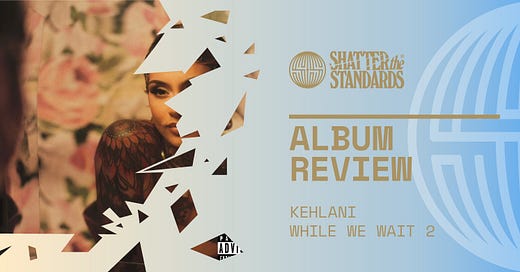Album Review: While We Wait 2 by Kehlani
After two months since Kehlani released ‘Crash,’ the L.A. singer-songwriter cooks up a sequel to their well-beloved mixtape from 2019.
Kehlani’s music trek on Crash, their fourth studio album released two months ago, dives into a whirlwind of emotions through an eclectic mix of genres. This album captures the rollercoaster of desire and introspection with a crisp and standard vibrancy. Here, Kehlani experiments with everything from dancehall’s buoyancy to R&B with a trap twist and even touches of country in their ballads, showcasing their versatility. The essence of Crash lies in its title, representing those fleeting yet intense emotional spikes. Kehlani’s narrative arcs from humble beginnings, sleeping on concrete, to their current acclaim, infusing their music with sharp, reflective insights that have become a hallmark of their work.
Rewinding to 2019, While We Wait presented a different chapter where Kehlani explored the complexities of love and communication in today’s digitally dominated era. The album felt like a scripted drama, delving into past traumas, the inadequacies of words, and the limitations imposed by traditional masculinity. Following mixed reviews of Crash, citing that they may have felt certain tracks didn’t live up to the production standards or creative expectations set by their previous works (plus the internet drama that we will not tackle because we’re not TMZ or Spiritual Word), Kehlani has returned to the studio, hinting at a sequel to what many considered their most cherished project from five years ago.
They continue with the early ’90s-2000s influence on the opener, “Love Like,” where DIXSON, Mamii, and D. Phelps provide a mid-tempo head-bopper as Kehlani goes in about physical and emotional intimacy, with vivid imagery and candid expressions of sexual desire. Their lyrics balance vulnerability and assertiveness, painting a picture of a love that is intense, consuming, and perhaps somewhat secretive. Kehlani employs vivid imagery and direct questions, such as “What have you done for me lately?” to confront her partner’s shortcomings on the Brandy-influenced, “S.I.N.G.L.E.,” aka ‘So I’m Never Gonna Love, Ever.’
On “Border,” Kehlani provides an honest detail of mental health struggles and the desire for escape. The hook introduces the central theme of wanting to leave California, symbolizing a need to break free from one’s current mental state, and they blend personal experiences with broader themes of love, self-care, and the search for stability. The self-discovery continues with a ballad of “First Life:” “How could I know what I want if I ain’t never been on my own?” Kehlani skillfully balances vulnerability and strength, acknowledging her emotional baggage (“these skeletons keep haunting me”) while expressing a willingness to be open and patient in a new relationship.
Camper provides some bounce on “Ballin,’” where the content revolves around the thrill and complexity of a secret romance, with Kehlani employing clever wordplay and metaphors to convey the intensity of the connection, while the upbeat and lively “Around” effectively communicates the song’s central theme of living in the moment and enjoying companionship without ulterior motives. The writing demonstrates a mature perspective on relationships, acknowledging the complexities of modern dating while advocating for a more relaxed, genuine connection. However, “Let Me Down” follows the romantic entanglement and suggests a desire to break free from potentially toxic patterns while acknowledging the difficulty.
While the record contains fourteen tracks, the last two are remixes from the previous effort. FLO appears on the fan-favorite “8,” where the ladies demonstrate their technical abilities with their harmonies, and “After Hours” features LUDMILLA providing an additional verse that doesn’t add to the original songs. The long-awaited “Know Better” finally made it to the listing, where Vince Staples delivers a decent verse towards the end, but it would’ve benefitted if Lil’ Mo gets a singing part beyond the ad-libs. KwN appears for a steamy, Timbaland-influenced “Clothes Off” as DIXSON joins for the ride on “Slow Dance,” serving as a euphemism for sexual intimacy while also conveying the idea of losing oneself in the moment with a lover.
Going over “When He’s Not There,” Kehlani and Lucky Daye explore themes of infidelity and clandestine encounters with nuanced lyricism. The song portrays a complex relationship dynamic where the narrator visits a partner who is in a committed relationship with someone else. Kehlani’s verses (the second verse is wild) paint a vivid picture of stolen moments, and Lucky’s contribution adds another layer to the narrative, highlighting the emotional and physical aspects of the affair. “Form of You” features Destin Conrad and CHILDOFNINES, but it’s not one of the highlights compared to others. WWW2 may not have the risks taken as Crash, but it gives Kehlani fans what they wanted since the original, and It Was Good Until It Wasn’t.
Solid (★★★½☆)
Favorite Track(s): “When He’s Not There,” “Border,” “First Life”





They could sing me the alphabet and I would be fine with that 💞